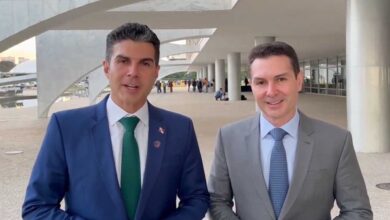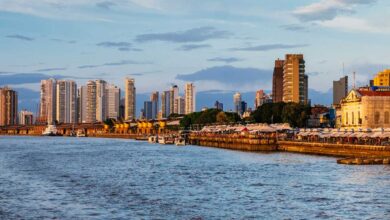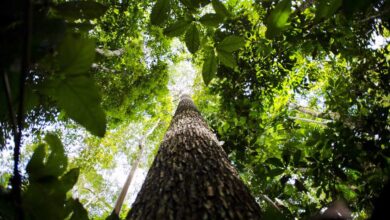
Regulariza Pará program cancels more than 200 irregular CARs linked to carbon projects
Carrying out the objective of carrying out actions to solve pending issues in the Rural Environmental Registry (CAR) overlapping the areas destined for the use and occupation of riverside communities, technical teams executing the Regulariza Pará Program analyzed the rural environmental cadastres registered in the municipality of Portel, investigating signs of irregularity in the CAR from rural areas linked to contracts that sell forest carbon credits. The records evaluated were registered on public lands intended for the sustainable use of traditional communities in Portel, which use the extraction of forest products and by-products as a source of income.
In the municipality of Portel, data show that approximately 28% of the local territory is covered by carbon credit contracts from the so-called ‘voluntary market’, that is, contracts signed between companies and community members on public lands. The asymmetric relationships of such contracts, including lack of transparency of contracts and violation of territorial rights, were reported to the State Secretariat for the Environment and Sustainability (Semas) which, after evaluating the registrations registered in the Rural Environmental Registry System of Pará (Sicar) , carried out the cancellation of 219 Registrations with verification of false or missing information, as well as suspended another 735 CARs with discrepancies in the declared data.
The action taken and the procedures adopted by Semas that resulted in the cancellation and suspension of the CAR in Portel were detailed to the local society in the public hearing coordinated by the Public Ministry of the State of Pará held on January 23rd. In the public hearing, there was a discussion with civil society and institutions about the federal and state policies implemented or being implemented on the subject of carbon credits, REDD+ and payment for environmental services, as well as on the Municipal Policy to Mitigate Global Warming and development of carbon credit projects in the municipality of Portel, as well as a debate on Free, Prior and Informed Consultation of traditional populations.
In addition to local society, representatives of traditional communities, representatives of the Land Institute of Pará (Iterpa), State Attorney General, Institute of Forestry and Biodiversity Development and Management (Ideflor-Bio), State Public Defender, members of the legislature and executive of the municipality, the Deputy Secretary for Management and Environmental Compliance at Semas, Rodolpho Zahluth Bastos, the Director of Geotechnology at Semas, Maximira Costa, and state attorneys, Tatilla Brito Pamplona and Ibraim Rocha.
The holder of the assistant secretariat of Semas, Rodolpho Zahluth Bastos, pondered that, in the cases already evaluated by Semas, the negotiation between companies and communities is clearly asymmetric, not observing principles and rights of access to information and transparency in a broad and unrestricted way of the communities, further noting that corporate hiring practices have generated many doubts and conflicts among community members, encouraging irregular actions without the consent of environmental agencies and state land holders who destined the land for the traditional use of communities.
“Another aspect to be noted is that part of these business initiatives has served as an inducer of irregular and potentially dubious practices, such as the registration of irregular individual CARs in collective territories and the signing of contracts in the all-inclusive model, that is, that are not limited to to the commercialization of carbon credits, including in the contractual package with the communities forest management projects and the suppression of vegetation for the establishment of extensive livestock and logging projects, which must be mandatorily analyzed by state agencies linked to land, environmental, territorial and, above all, subject to control and social approval”, explained the deputy secretary of management and environmental regularity, Rodolpho Zahluth Bastos.
The commercialization of carbon credits is an initiative that can and should encourage good environmental practices that value the living forest and enable the socioeconomic development of the people who live in it, but that must obey the regulations. “It’s not a question of criminalizing carbon credit contracts, but the situation in Portel urgently needs a ‘cleaning brake’, so as not to discourage serious initiatives. It is necessary, at the very least, to regulate at the state level, the obligation of a state register of carbon initiatives and contracts, even if it is considered a voluntary market, principles and procedures to be obeyed and, above all, to protect the territorial rights of the communities to which the State destined the use of these forests”, evaluated Bastos.
Within the scope of the Regulariza Pará Program, the state environmental agencies will be integrated for the land and environmental regularization of collective areas that can benefit from the credit market, as an incentive for the conservation of the standing forest and the maintenance of sustainable practices in the use of natural resources . Soon, a team from Semas will go to the municipality with guidance on the Collective CAR of territories, while Iterpa will make a call for the presentation of contracts in order to evaluate them.
Regularizes Pará
The program was regulated by State Decree No. 2,745, of November 9, 2022. It corresponds to the set of actions and instruments for implementing the structural component “Land, Territorial and Environmental Planning” of the Amazon Agora State Plan (PEAA). It presents the objectives of: guaranteeing the integrity of specially protected territorial spaces, promoting the environmental and land tenure regularization of rural properties, encouraging the recomposition of degraded rural areas and encouraging the maintenance of native vegetation.
Source Agency Pará








